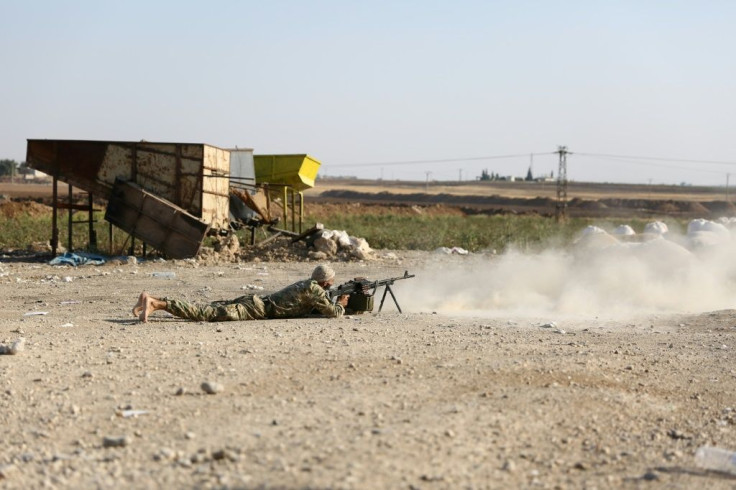US To 'Evacuate' Northern Syria Over 'Utenable Situation' As Turks Continue To Advance

President Donald Trump's decision to abandon northeast Syria and the Kurds to the mercies of Turkey has forced the United States to abruptly withdraw all its remaining forces from the Kurdish-controlled region to avoid a war with the Turkish Armed Forces.
About 1,000 troops U.S. will withdraw "as safely and quickly as possible," said Secretary of Defense Mark Esper to CBS' "Face the Nation" Sunday. On Saturday, Trump signed the withdrawal order ending much of the U.S.' military's presence that prevented this war from erupting.
"And so we find ourselves, we have American forces likely caught between two opposing advancing armies, and it's a very untenable situation," said Esper.
"So I spoke with the president last night, after discussions with the rest of the national security team, and he directed that we begin a deliberate withdrawal of forces from northern Syria."
Some 300 U.S. soldiers will remain in the U.S. Army's Al-Tanf military base in Syria's Homs Governorate located 24 km west of the al-Tanf border crossing in the Syrian Desert. The withdrawal order hasn't been carried out yet.
This comes as the Turkish Armed Forces escalated its military operation in the region, forcing the Kurds to redeploy fighters guarding captured ISIS fighters against the Turks. Hundreds of family members of ISIS fighters held at the al-Hol prison camp are said to have escaped after their SDF guards left.
Turkey's offensive has forced the Syrian Democratic Forces (SDF) into an alliance with Syria, its long-time foe. The government of Syrian dictator Bashar al-Assad, who is supported by Russia, on Sunday announced the deployment of Syrian Arab Army troops to northern Syria to confront the Turks and support the SDF.
Esper said the worsening conflict -- which was ignited by Trump's decision to green light Turkey's offensive -- had become "untenable" for the U.S. military. Turkish military and its allied militia had set up roadblocks on the vital M4 Highway that cut-off the U.S. military's ability to move safely in the northeast and without coming into contact with the Turkish forces.
Esper said the rapid advance of the Turkish military and its militia allies means U.S. forces are at risk of becoming isolated and attacked. There is also the heightened risk of confrontation between Turkish troops and U.S. troops.

U.S. Army officers quoted by American media say it's increasingly clear the Turkish forces are trying to drive the Americans away.
Asked if the U.S. military has the authority to return fire if attacked by Turkey, Esper said U.S. troops "have the right to self defense and we will execute it if necessary."
Turkish president Recep Erdogan Sunday announced a broadening of the Turkish offensive in both north to south and west to east axes in violation of earlier statements he made to Trump.
The ground offensive by the Turkish Land Forces or the Turkish Army code-named "Operation Peace Spring" launched Oct. 9 is aimed at expelling the SDF, the U.S. ally that played the major role in the final destruction of ISIS last March in eastern Syria, from the ground under assault.
Turkey sees the SDF as a terrorist organization due to its ties with the Kurdistan Workers Party (PKK). Turkey's other aim is create a 30 kilometer-deep "safe zone" in northern Syria where it plans to resettle more than 3.6 million Syrian refugees it currently harbors.
Turkey's offensive was condemned by the European Union, the Arab League, Iran, Israel, India and the United Kingdom as an assault on the territory of a sovereign and Arab state (Syria), and an irresponsible destabilizing action with "potentially terrible" humanitarian consequences.
Trump defended his abandonment of the Kurds by inanely saying they didn't come to the aid of the United States during World War 2.
© Copyright IBTimes 2025. All rights reserved.





















